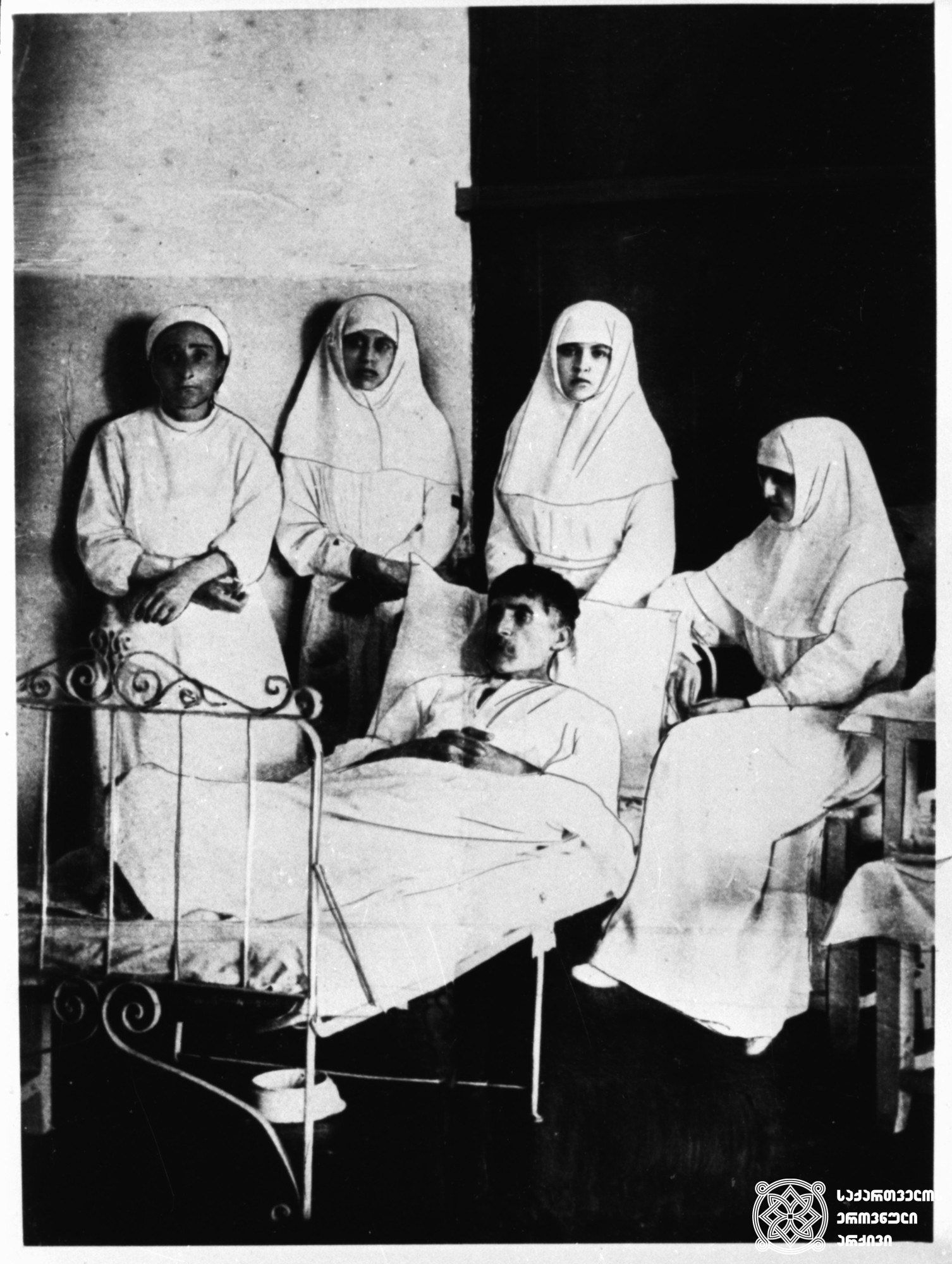

Vazha-Pshavela with family members. Chargali, 1907.
Vazha-Pshavela considered his date of birth to be May 15, 1862, despite this, another date is established in his biography - July 14, 1861 (old style). The basis for this is the 1861 metric book of the Church of St. George of the village of Chargli preserved in the National Archives of Georgia.
The writer devoted a special publication to this issue in the "People's Gazette" N584 of 1912: "A small note".
"If a biography is written, it should be written with the truth, moreover, the falsity should be corrected during my lifetime, because it will happen even after my death. I was born in the village in Chargali in 1862 On May 15..."
Vazha-Pshavela's father, Pavle Razikashvili, was a clergyman, and his mother was Barbale (Gulkan) Pkhikelashvili.
Vazha-Pshavela wrote about his parents in his autobiographical work:
"I am from St. Pshaveli, both on my mother's side and on my father's side. My mother was an Ivre woman, from the village of Skhlovni, of the Phkhikliant family. He created satirical poems and even today all the people of Pshave "poem" to his tune; Unfortunately, he did not know how to read and write, so his works were preserved thanks to paper, although his poems are still alive today, and people sing them. These poems are full of deep humor. My mother didn't know how to read and write either, although she was very talented by nature, an excellent housewife and merciful, a good reader, a neighbor's helper; Dedi-Chem's kindness remains exemplary even today. He went to the grave in such a way that no one remembers him, no.
When I knew my father, he was the chief deacon of the village. Magharoskar, S. Eight verses away from Chargali. Whenever he was at home, he always told me stories from the old divine history, taught me how to read and write in the old way. He would put the meat on the board as a plate for the meat, and I would also sit on the throne and listen to his sweet talk, because I liked some stories from the Old Testament, they attracted my attention: the defeat of Goliath by David, the actions of the mighty Samson, the dedication of the Maccabean brothers, etc. ... and I must also mention that my head was strongly presented to Samson, because my mother said about me that I had big hair, when I was born, it almost covered my eyes, and I used to ask: why did you braid my hair, Still, this "hairiness" made me think about myself, made me see myself as an extraordinary person and set an extraordinary future for me."
"My world", works of Vazha-Pshavela, volume 5, 1936
Vazha-Pshavela received primary education in her family, and at the age of 8, "my father enrolled me in Telavi theological school. From the third grade of this school, I entered the Civil School of Tbilisi, which is located next to the institute. After finishing the course at the civil school, I entered the seminary of Gori. When I finished my studies there, I was appointed a teacher in Toladsofel (Ertso), where I stayed for one year and then I went to St. Petersburg to listen to lectures at the university..." ("People's newspaper", "Small Note", 1912. N584).
Ekvtime Takaishvili wrote in his memoirs about his studentship:
"I met Vazha-Pshavela for the first time in St. Petersburg, when I entered the university, he came as a free listener and attended a session of Georgian students on community issues. He knew by heart a poem from the folk poetry of Pshav-Khevsureti. He didn't have any notebooks or written documents in his hands and we were all amazed how he could memorize so many poems."
Luka Razikashvili under the pseudonym L. Ra-vi appeared for the first time in 1879 in the newspaper "Droeba" (No. 11) with the publication "Tserili Khevsuretidan". This was followed by the translation of Erkman-Shatrian's story "Feodalis Aghzrda" (1880, "Iveria", No. 4).
His first poem "Meomari" was published in 1881 ("Imedi", No. 3-4), and his first short story "Surati Pshavelis tskhovrebidan" - in 1881 ("Droeba", No. 184).
His epic poems on the national theme are especially popular: "Aluda Ketelauri" (1888), "Bakhtrion" (1892), "Stumar-Maspindzeli" (1893), "Gvelis Mtchameli" (1901) and others.
Humanism is a consequence of the writer's creativity. In this regard, the samples of lyrical prose are distinguished: "Shvlis Nukri Naambobi" (1883), "Khmeli Tsipeli" (1888-1889), "Quchi" (1892), "Mtani Maghalni" (1895) and others.
Vazha-Pshavela's stories were printed as a book for the first time in 1889. In 1896-1898, several more books were added to the first edition, including "Amodis, Natdeba" and "Akhundi", which are kept in the scientific reference library of the National Archives of Georgia.
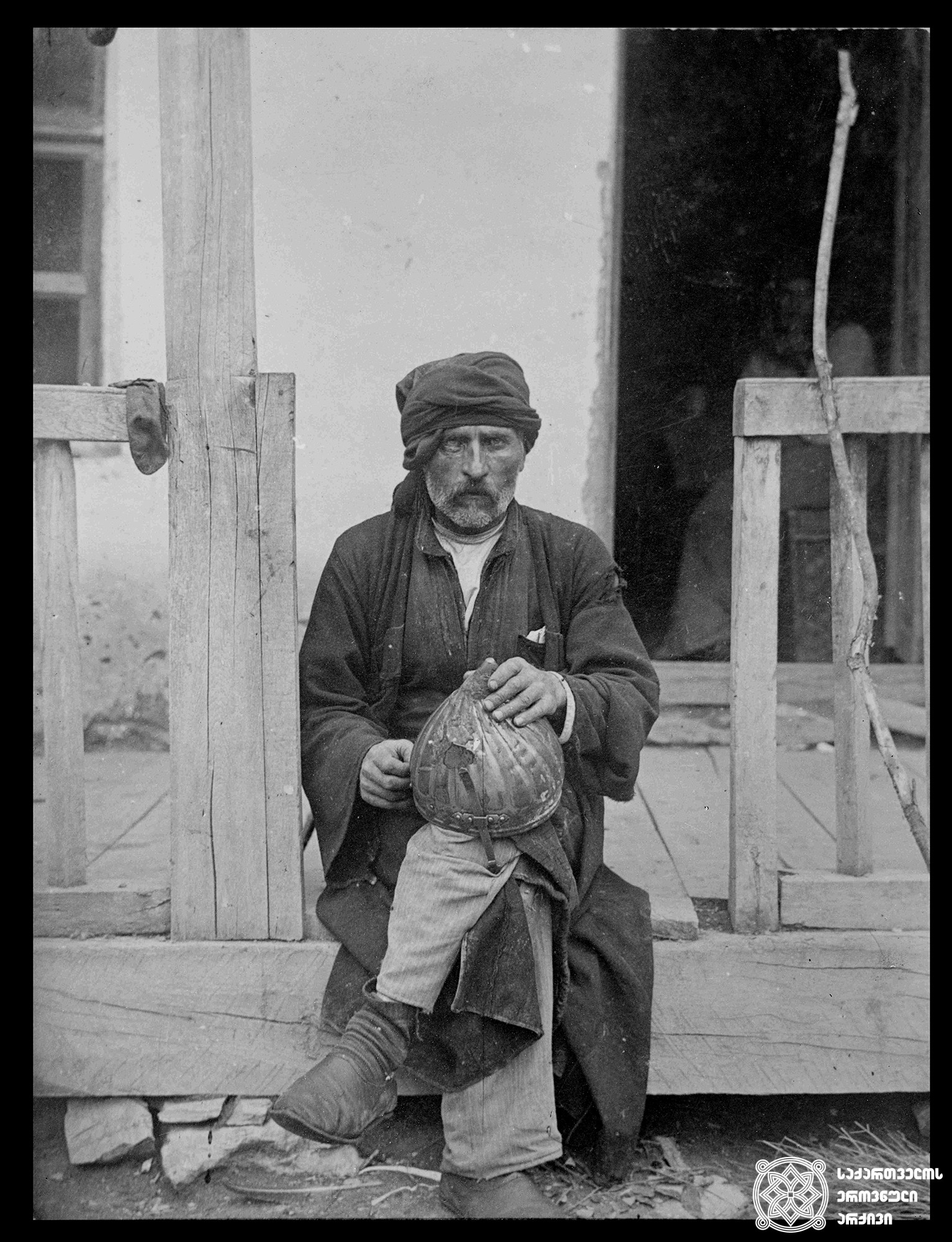
...Has this been the case before, Apkhusho? It was surrounded by a fortress-wall. There were people of different races; They will not give us rest if we do not drink openly, I told the enemy. Once, the Tatar army came, they destroyed the place, and killed the prisoners; I counted you on the Zhinvan bridge, said my excited uncle, I am happy, sixty men and sixty women. Well, don't watch, tell that cursed ghost, if he is either lame or blind, if he can hold a grudge against someone?! Ghachaura used to be a courtier of the king, and he had a good time capturing the Tatars, when a ball would come out in their apartment, it was a sign that the Tatars would eat bread, and when it went out, they would go to sleep. At the time of the breaking of Apkhusho, Ghachaura was at the mowing, he saw the flame of fire from there, he said that Apkhushue is in trouble, and he was released; When he arrived, Apkhusho met him in shock; One by one, you are chasing people and chasing the enemy. He is fighting against the enemy and the Khan who sits in the tent is shahrvardin inside, with an unguarded sword on his helmet; Elizbari, Ghachaurai's brother, condemns his brother: "You fool, you use the sword like a fool."
"Maghla ki Nu Scem Spilosa,
Dabla Shamahkar Mbilosano"
You will protect me with your tip, you will not be able to hold the iron anymore and you will kill me. You have taken a lot of gold and silver from me, you will also return the captives; This helmet was donated to the deceased. Shilindi will be held today, "Shesandobrebs" will be staged.
Audiobooks of Vazha-Pshavela's works are also stored in the National Archive of Georgia:
Patara Mtsyemsis Fikrebi - Vazha-Pshavela. Reading: Zinaida Kverenchkhiladze, 1972
Shvlis Nukris Naambobi - Vazha-Pshavela. Reading: Tamaz Kvatchantiradze, 2014.
Amodis Natdeba - Vazha-Pshavela. Reading: Guram Sagaradze, 1976
Lmobieri Monadire - Vazha-Pshavela. Reading: Giorgi Gegechkor, 1974
Fesvebi - Vazha-Pshavela. Reading: Medea Chakhava, 1974
Based on Vazha-Pshavela's stories, Tengiz Abuladze made a feature film "Vedreba" (1967) and Nodar Managadze - "Ivane Kotorashvilis Ambavi" (1974).
"Chkhikvta Kortsili" was the basis of Arkady Khintibidze's animated film. In 1979, a musical by Alexander Basilaya was staged with the same name.
Vazha-Pshavela was a school teacher in the village of Didi Toneti in 1886-1887. Many of his autographs are stored in the archive of the Society for Spreading Literacy among Georgians, which reflect that period.
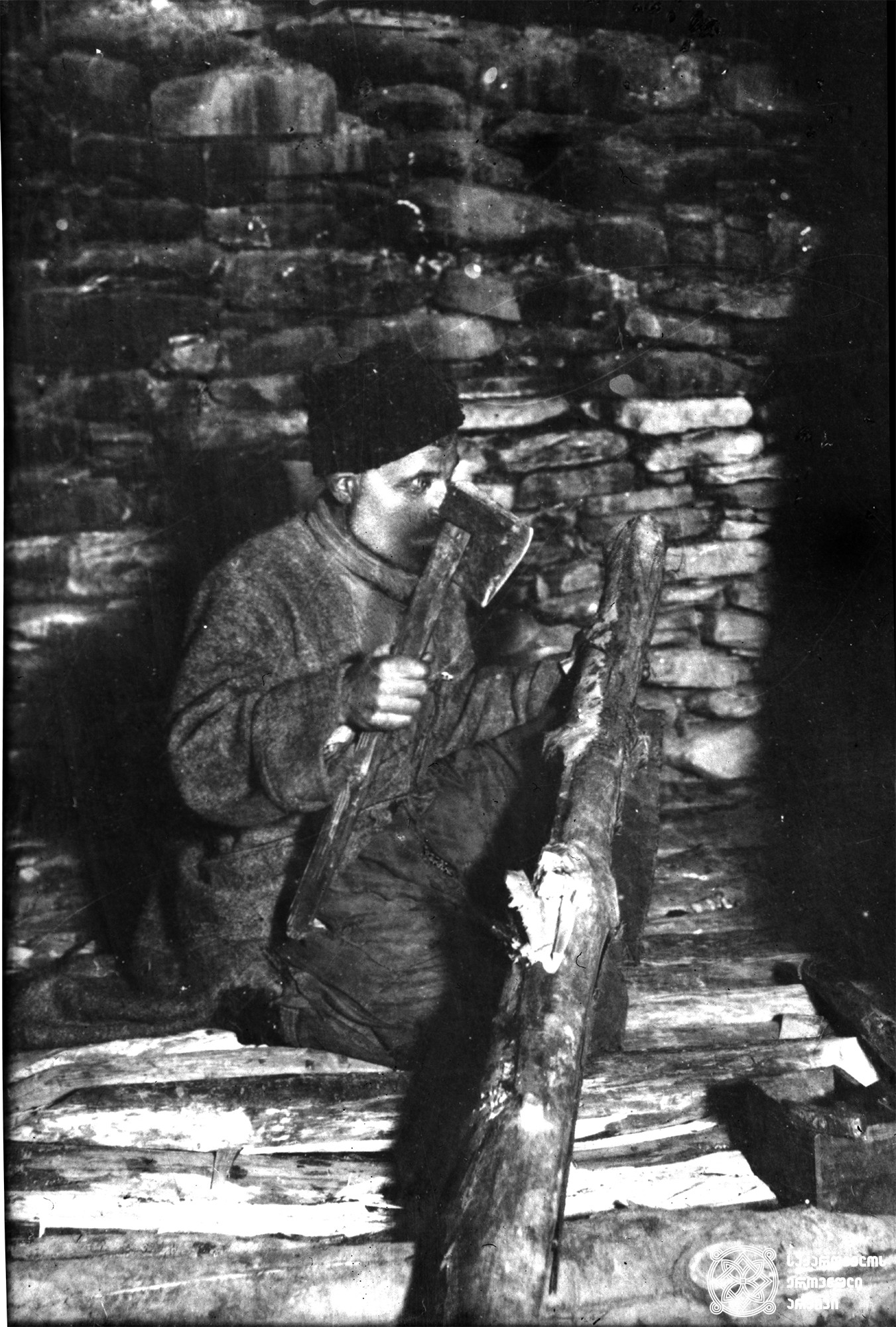
Vazha-Pshavela continued to cooperate with the literacy society on the issue of publishing his own works.
In 1893, he approached the community board with an interesting idea - the writer wanted to open a mobile school for people living in the mountains.
.jpg)
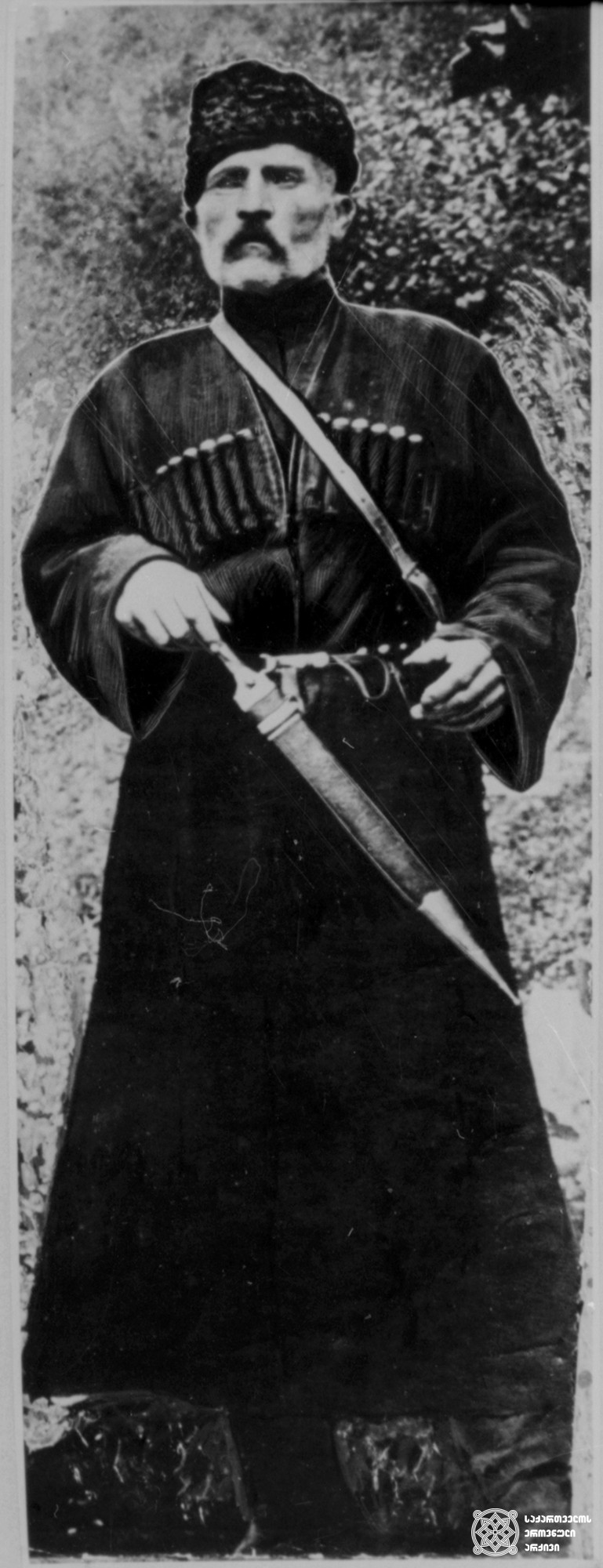
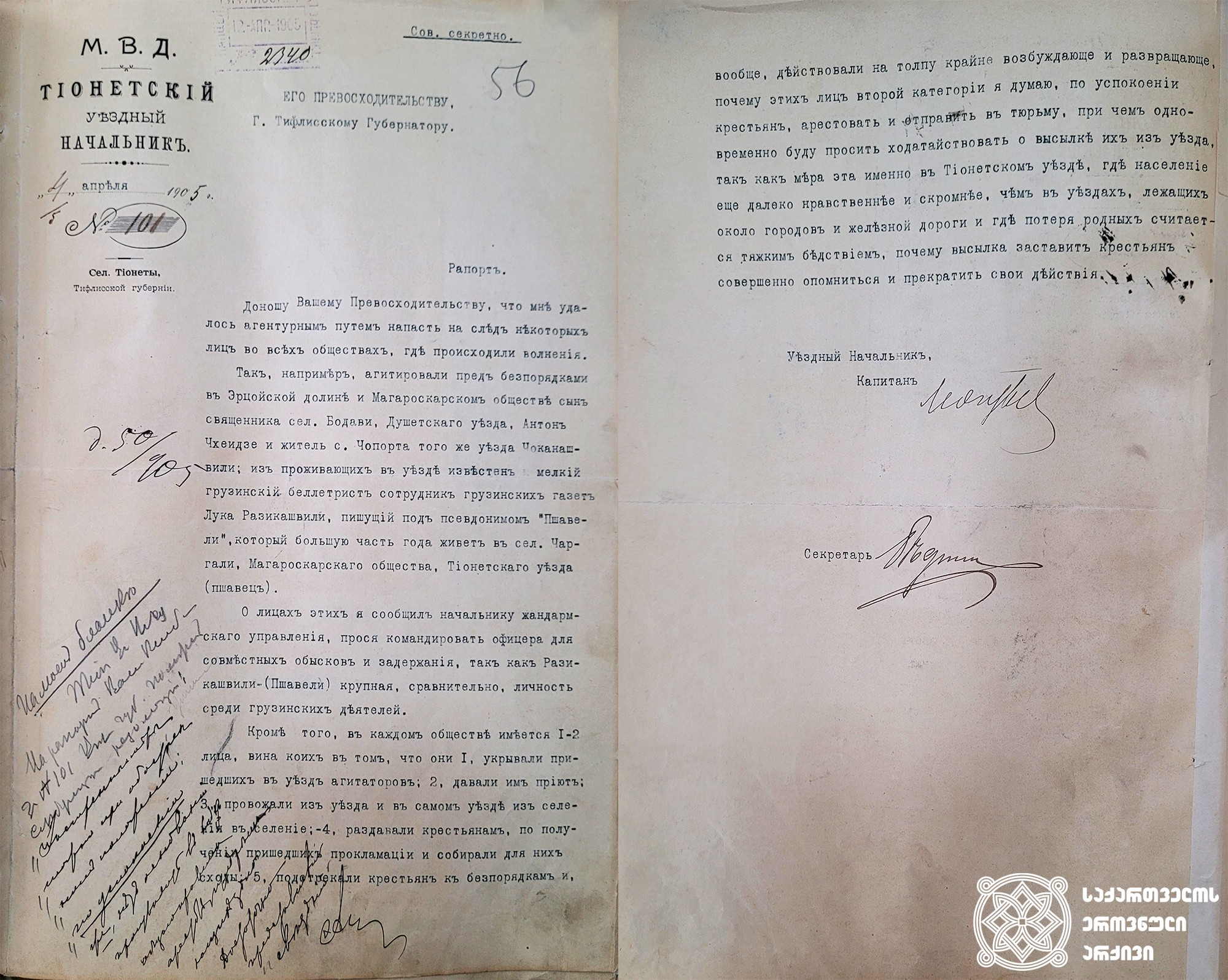
Vazha-Pshavela's son Levan Razikashvili (1887-1923) was a military officer. She became close to Kakutsa Cholokashvili while studying at the Tbilisi High School. In 1917, he joined the Social-Federalist Party of Georgia. He served as the chief of Pshavi militia.
After the Sovietization of Georgia, he sympathized with the partisans operating in Khevsureti, which is why he was arrested in 1922 and sentenced to be shot on charges of banditry.
The petition of Georgian writers to Sergo Orjonikidze was unsuccessful. In February 1923, Levan was executed, but even that was not enough. The Soviet authorities also removed him from the photographs, although, fortunately, the original photographs have reached us.
